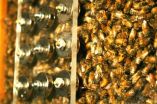(Press-News.org)
VIDEO:
This movie spotlights one waggle dance by a forager that had been sleep-deprived the
previous night. The average dance angle of this dance is superimposed over the dancer and variance around...
Click here for more information.
AUSTIN, Texas—In the busy world of a honey bee hive, worker bees need their rest in order to best communicate the location of food to their hive mates, research from The University of Texas at Austin shows.
"When deprived of sleep, humans typically experience a diminished ability to perform a variety of tasks, including communicating as clearly or as precisely," said Dr. Barrett Klein, a former ecology, evolution and behavior graduate student at the university. "We found that sleep-deprived honey bees also experienced communication problems. They advertised the direction to a food site less precisely to their fellow bees."
For humans, imprecise communication can reduce efficiency, cost money, and in some cases, cost lives. For honey bees, Klein says it could affect their success in locating food, which could lead to a less competitive colony.
"While the importance of sleep has been studied in Drosophila flies for several years," said Dr. Ulrich Mueller, professor of biology and study coauthor, "Barrett's study is the first to address the function of sleep in a social insect in the context of its society, and the first to show that sleep deprivation impairs precision of communication in an insect."
The research was published in PNAS Early Edition this week.
There are various ways to poke and prod humans to force them to stay awake prior to measuring the effects of sleep deprivation. But how to make bees in a hive lose sleep?
Klein invented a magnetic machine aptly named the "insominator," a contraption he passed over quietly resting bees during the night to deprive them of sleep. The bees, outfitted with small metallic backpacks, were jostled into activity by magnets in the insominator, and this was repeated over the course of normal sleep time.
Barrett then recorded the behaviors of the sleepless bees and discovered they weren't able to communicate as well the direction of nectar-filled flower patches to their sisters through their usual waggle dance.
"The dance was not necessarily wrong, but it was less precise than dances performed by bees that were not sleep-deprived," says Klein. "We expect that a less precise dance would lead to fewer followers making it to the food source, and we hope to test this in the future."
INFORMATION:
Klein is a researcher at Universität Würzburg in Germany. His coauthors include Arno Klein from Columbia University, Margaret Wray and Thomas Seeley from Cornell University and Ulrich Mueller at The University of Texas at Austin.
Additional Contact Information:
Klein can also be reached on Skype with the username: pupating
Lee Clippard, media relations
512-232-0675
lclippard@mail.utexas.edu
Sleepless honey bees miscommunicate, too, research at the University of Texas at Austin shows
2010-12-14
ELSE PRESS RELEASES FROM THIS DATE:
Protein restores learning, memory in Alzheimer's mouse model
2010-12-14
SAN ANTONIO, Texas, U.S.A. (Dec. 13, 2010) — Scientists at the UT Health Science Center San Antonio restored learning and memory in an Alzheimer's disease mouse model by increasing a protein called CBP. Salvatore Oddo, Ph.D., of the university's Department of Physiology and Barshop Institute for Longevity and Aging Studies, said this is the first proof that boosting CBP, which triggers the production of other proteins essential to creating memories, can reverse Alzheimer's effects.
The finding, reported this week in Proceedings of the National Academy of Sciences, provides ...
Quantifying fragmentation of medical information
2010-12-14
Boston, Mass. – It's widely recognized that fragmentation of medical information is a problem in health care, but the extent of the problem and how many patients may be at risk haven't been well quantified. In a new retrospective study, researchers at Children's Hospital Boston looked at adult acute care in Massachusetts and found that of 3.6 million adults visiting an acute care site during a five-year period, almost a third sought care at two or more different hospitals. These patients accounted for more than half of all acute care visits in the state, as well as more ...
A benefit of flu: protection from asthma?
2010-12-14
The number of people with asthma has increased sharply over the past few decades. It has been suggested that this is a result of decreased childhood exposure to microorganisms. A team of researchers — led by Dale Umetsu, at Harvard Medical School, Boston; Michio Shimamura, at the University of Tsukuba, Japan; and Petr Illarionov, at the University of Birmingham, United Kingdom — has now provided concrete evidence in mice to support this idea and identified an underlying mechanism to explain this protection, which the team hope could be exploited to develop ways to prevent ...
New approaches needed for treating chronic myeloid leukemia
2010-12-14
Chronic myeloid leukemia (CML) was transformed from a fatal disease to a chronic condition by the development of a drug known as imatinib, which targets the protein that drives this disease (BCR-ABL). However, imatinib does not cure patients, they must take the drug lifelong, as disease recurs if they stop taking it. This is because imatinib does not kill all the CML cells; some, which are known as CML stem cells, persist. A key to therapeutically targeting CML stem cells is knowing whether they rely on BCR-ABL to persist. Answers to this will determine whether more effective ...
JCI online early table of contents: Dec. 13, 2010
2010-12-14
EDITOR'S PICK: A benefit of 'flu: protection from asthma?
The number of people with asthma has increased sharply over the past few decades. It has been suggested that this is a result of decreased childhood exposure to microorganisms. A team of researchers — led by Dale Umetsu, at Harvard Medical School, Boston; Michio Shimamura, at the University of Tsukuba, Japan; and Petr Illarionov, at the University of Birmingham, United Kingdom — has now provided concrete evidence in mice to support this idea and identified an underlying mechanism to explain this protection, which ...
Soda taxes: Weight loss benefit linked to household income
2010-12-14
DURHAM, N.C. – Imposing higher taxes on sodas and other sweetened drinks may generate a lot of money – but would lead to only minimal weight loss among most people and would have no effect on weight among consumers in the highest and lowest income groups, according to new research from Duke-National University of Singapore (NUS) Graduate Medical School.
The study, led by Eric Finkelstein, PhD, associate professor of health services at Duke-NUS, looked at the differential impact on calories and weight of a 20 percent and 40 percent tax on sodas and other sweetened beverages ...
Scientists unravel more details of plant cell-wall construction
2010-12-14
UPTON, NY - One big challenge in converting plants to biofuels is that the very same molecules that keep plants standing up make it hard to break them down. Now scientists at the U.S. Department of Energy's (DOE) Brookhaven National Laboratory are unraveling details of how plant cells' structural supports - their cell walls - are made, with the hope of finding ways to change their composition for more efficient biofuel production.
In a paper to be published the week of December 13, 2010, in the Proceedings of the National Academy of Sciences, the researchers describe ...
Ovarian cancer clue: Methylation-mediated suppression of a key pathway is found
2010-12-14
December 14, 2010 – Ovarian cancer is the leading cause of death among gynecological cancers. To better understand the disease and improve therapies, researchers are investigating how deregulation of genes across the genome could be contributing to malignancy. In a study published online today in Genome Research (www.genome.org), scientists have identified age-related gene-specific accumulation of DNA methylation that suppresses a critical cellular pathway contributing to ovarian carcinogenesis, information that will be crucial for future translational research.
Epigenetic ...
Hot with decades of drought: Expectations for the Southwest
2010-12-14
An unprecedented combination of heat plus decades of drought could be in store for the Southwest sometime this century, suggests new research from a University of Arizona-led team.
To come to this conclusion, the team reviewed previous studies that document the region's past temperatures and droughts.
"Major 20th century droughts pale in comparison to droughts documented in paleoclimatic records over the past two millennia," the researchers wrote. During the Medieval period, elevated temperatures coincided with lengthy and widespread droughts.
By figuring out when ...
Over long haul, money doesn’t buy happiness: 'Easterlin Paradox' revisited
2010-12-14
LOS ANGELES, Calif. — December 9, 2010 — A new collaborative paper by economist Richard Easterlin — namesake of the "Easterlin Paradox" and founder of the field of happiness studies — offers the broadest range of evidence to date demonstrating that a higher rate of economic growth does not result in a greater increase of happiness.
Across a worldwide sample of 37 countries, rich and poor, ex-Communist and capitalist, Easterlin and his co-authors shows strikingly consistent results: over the long term, a sense of well-being within a country does not go up with income.
In ...


